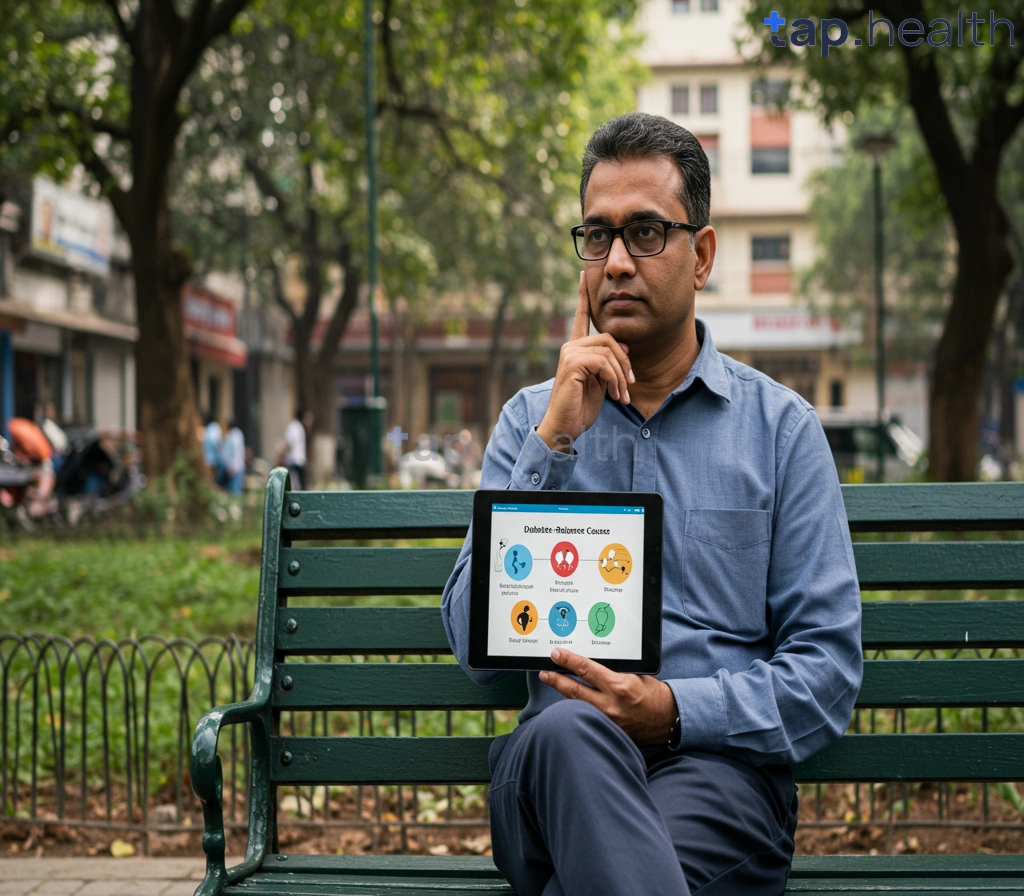Table of Contents
- Understanding Diabetic Diarrhea: Causes & Solutions
- Managing Diarrhea with Diabetes: A Practical Guide
- Diabetes and Loose Stools: What You Need to Know
- Is Your Diarrhea Diabetes-Related? Find Out Now
- Prevent & Treat Diabetic Diarrhea Effectively
- Frequently Asked Questions
- References
Dealing with diarrhea can be disruptive, but when you have diabetes, it can be even more concerning. Understanding Diabetes-Related Diarrhea: Causes and Management Strategies is crucial for maintaining your overall health and well-being. This common complication isn’t always straightforward, stemming from various factors including medication side effects, high blood sugar levels, and even infections. This blog post will explore the potential causes behind this troublesome symptom and provide practical, actionable management strategies. Let’s delve into the details so you can feel more empowered in managing your diabetes.
Understanding Diabetic Diarrhea: Causes & Solutions
Diabetic diarrhea is a common and often distressing complication affecting individuals with diabetes, particularly prevalent in warmer climates like those found in India and other tropical countries. It significantly impacts quality of life, and understanding its causes is the first step towards effective management. One contributing factor may be related to the increased risk of kidney disease associated with diabetes. Nearly 30% of people with diabetes develop diabetic nephropathy, which can affect digestive function and lead to diarrhea.
Causes of Diabetic Diarrhea in Tropical Climates
Several factors can trigger diabetic diarrhea, especially in regions with high humidity and temperatures. These include gastroparesis (delayed stomach emptying), autonomic neuropathy (nerve damage affecting the digestive system), and infections that are more common in warmer, humid environments. Dietary indiscretions, such as consuming contaminated street food or fruits and vegetables that haven’t been properly washed, can also play a significant role. Furthermore, certain medications used to manage diabetes can have diarrhea as a side effect. Managing your diet is crucial, and you might find helpful tips in our article on Diet Chart for Diabetic Patients to Control Diabetes.
Managing Diabetic Diarrhea: Practical Strategies
Effective management involves a multi-pronged approach. Maintaining good blood sugar control is crucial, as unstable blood glucose levels can exacerbate digestive issues. Dietary modifications, including avoiding trigger foods and consuming small, frequent meals, can also be beneficial. Staying hydrated is extremely important, especially in tropical climates. Consult your doctor to rule out underlying infections and to discuss medication adjustments if necessary. Probiotics may be helpful in restoring gut health, though this should be discussed with a healthcare professional.
Seeking Expert Advice in India and Tropical Regions
If you are experiencing persistent diabetic diarrhea, it’s vital to seek medical attention promptly. Early diagnosis and appropriate management are key to improving your quality of life and preventing further complications. Many hospitals and clinics in India and other tropical countries offer specialized care for diabetes and its associated complications. Don’t hesitate to reach out to a healthcare professional for personalized guidance and support. Sometimes, blood sugar fluctuations can lead to unexpected symptoms. If you’re experiencing unusual sleepiness after meals, you might find our article on Why Do Diabetics Get Sleepy After Eating? helpful.
Managing Diarrhea with Diabetes: A Practical Guide
Diarrhea, characterized by loose, watery stools, can be particularly challenging for individuals with diabetes. It can disrupt blood sugar control, leading to dehydration and potentially dangerous complications, especially in hot and humid climates prevalent in Indian and tropical countries. Understanding the causes is crucial for effective management.
Common Causes of Diarrhea in People with Diabetes
Several factors can contribute to diarrhea in individuals with diabetes. Infections, like viral gastroenteritis, are common culprits, often exacerbated by weakened immunity sometimes associated with poorly controlled blood sugar. Certain medications used to manage diabetes can also induce diarrhea as a side effect. Dietary indiscretions, particularly consuming foods high in fructose or artificial sweeteners common in processed foods prevalent in many Indian and tropical markets, can also trigger episodes. Finally, underlying conditions like irritable bowel syndrome (IBS) can co-exist with diabetes, increasing the likelihood of diarrhea.
Managing Diabetic Diarrhea: Practical Strategies
Effective management hinges on identifying the underlying cause. If infection is suspected, consult a doctor promptly. For medication-induced diarrhea, discuss alternative options with your physician. Dietary adjustments are critical. Maintaining a balanced meal plan is vital, with a focus on easily digestible foods. For most people with diabetes, a carbohydrate intake of around 45–60 grams per meal is generally recommended, but individual needs vary, so consult a doctor or registered dietitian for personalized advice. Staying hydrated is paramount, especially in warmer climates. Oral rehydration solutions (ORS) can help replenish lost fluids and electrolytes. Probiotics, beneficial bacteria found in yogurt and certain supplements, may also aid in restoring gut health. Remember, seeking professional medical advice is essential for any persistent or severe diarrhea. For more tips on overall diabetes management, check out 10 Proven Tips for Effective Diabetes Management.
Seeking Help in India and Tropical Countries
In India and tropical countries, access to quality healthcare can vary. It’s crucial to seek advice from qualified medical professionals familiar with the local context and potential environmental factors influencing gastrointestinal health. Prompt medical attention is especially important for severe diarrhea, which can quickly lead to dehydration and complications. Don’t hesitate to seek help if your diarrhea persists or worsens. Managing diabetes effectively becomes even more critical as you age, so learn more about the Challenges and Solutions of Managing Diabetes as You Age.
Diabetes and Loose Stools: What You Need to Know
Diabetes can significantly impact your digestive system, and experiencing diarrhea is a common complication. While not directly caused by high blood sugar, poorly managed diabetes can contribute to various gastrointestinal issues, including frequent loose stools. This is particularly relevant in Indian and tropical countries where certain dietary habits and environmental factors can exacerbate the problem. Understanding the causes and implementing effective management strategies is crucial for maintaining overall health.
Causes of Diarrhea in Diabetics
Several factors can link diabetes to diarrhea. High blood sugar levels can damage nerves in the digestive tract (diabetic neuropathy), leading to slowed bowel movements or, conversely, increased motility resulting in loose stools. Furthermore, certain medications used to manage diabetes can have diarrhea as a side effect. In tropical climates, infections are more prevalent and can be more challenging to manage in individuals with diabetes due to compromised immune function. Dietary factors, common in many Indian and tropical cuisines, rich in certain carbohydrates or spices, can also trigger digestive upset in some individuals.
Managing Diabetes-Related Diarrhea
Effective management involves careful blood sugar control, a crucial aspect of preventing many diabetes-related complications. This includes adhering to your prescribed medication regime and maintaining a healthy diet. Consult your physician or a registered dietitian to create a personalized meal plan that minimizes triggers and supports your digestive health. Staying hydrated is vital, especially in warmer climates, to prevent dehydration often associated with diarrhea. Probiotics might be beneficial, but always seek professional medical advice before introducing them.
Remember, while nearly 15% of diabetics experience foot ulcers in their lifetime, with high amputation risks, proactive management of conditions like diabetes-related diarrhea contributes to overall well-being and reduces the risk of developing further complications. Consult a healthcare professional immediately if your diarrhea is severe, persistent, or accompanied by other symptoms. For more information on other diabetes-related complications, you might find our article on Does Diabetes Cause Swollen Feet? Understanding the Connection helpful. The connection between diabetes and overall health is significant, and understanding the link between Understanding the Link Between Diabetes and Obesity can also be beneficial in managing the condition effectively.
Is Your Diarrhea Diabetes-Related? Find Out Now
Diarrhea is a common ailment, but when coupled with diabetes, it can become significantly more concerning. While not directly caused by diabetes itself, several factors associated with the condition can trigger digestive distress, particularly in hot, humid climates prevalent in many Indian and tropical countries. For example, individuals with poorly controlled blood sugar are more susceptible to infections, and these infections can easily manifest as diarrhea. The high ambient temperatures also exacerbate dehydration, a serious risk for those with diabetes.
Common Causes of Diabetes-Related Diarrhea
Several factors can contribute to diarrhea in individuals with diabetes. These include gastroparesis (delayed stomach emptying), which is more common in people with diabetes, leading to irregular bowel movements. Additionally, certain medications used to manage diabetes, such as metformin, can sometimes cause digestive upset, including diarrhea. In tropical regions, the increased prevalence of infectious diarrhea adds another layer of complexity. The combination of these factors can lead to more frequent and severe diarrhea episodes.
Management Strategies for Diabetic Diarrhea
Effective management involves controlling blood sugar levels. Strict adherence to a prescribed diabetic diet, including regular meals and avoidance of high-sugar foods, is crucial. Staying well-hydrated is paramount, especially in warmer climates, as dehydration worsens diarrhea symptoms. Consult your doctor immediately if you experience persistent or severe diarrhea, especially if accompanied by fever, blood in your stool, or significant weight loss. Remember, early intervention is key to managing this potentially serious complication of diabetes. Early diagnosis and management are especially important given that approximately 35 per 10,000 U.S. youths have diagnosed diabetes, according to the CDC. This highlights the significance of understanding the relationship between diabetes and diarrhea. Recognizing the early signs of diabetes is vital; for more information, see our blog on 10 Early Signs and Symptoms of Diabetes?
Seeking Help in Tropical Countries
In Indian and tropical countries, access to quality healthcare can vary. Seek medical attention promptly if you experience prolonged or severe diarrhea, ensuring appropriate diagnosis and treatment tailored to your individual needs and the specific challenges of your region. Don’t delay seeking help – your health is paramount. If you’re wondering about the potential viral or bacterial causes of diabetes, you might find our article on Is Diabetes Caused by a Virus or Bacteria? helpful.
Prevent & Treat Diabetic Diarrhea Effectively
Understanding the Link Between Diabetes and Diarrhea
Diabetic diarrhea, a common complication for many, significantly impacts quality of life. It’s crucial to understand that this isn’t just a random occurrence; diabetes can disrupt the delicate balance of your gut, leading to frequent, watery stools. This is often exacerbated by factors prevalent in Indian and tropical countries, such as dietary habits and infections. For instance, the high prevalence of certain foodborne illnesses in these regions can further complicate the issue for those with diabetes.
Effective Management Strategies
Dietary adjustments are paramount. Focus on a balanced diet low in refined sugars and high in fiber, crucial for maintaining healthy bowel movements. Avoid trigger foods like excessive caffeine, alcohol, and artificial sweeteners, commonly found in processed foods prevalent in many Indian and tropical markets. Staying well-hydrated is also essential; plenty of clean drinking water is key. For more information on creating a healthy diet, consider exploring a Pre Diabetic Diet Chart which can help prevent diabetes and manage related complications.
Medication and Medical Advice
While dietary changes form the cornerstone of management, some individuals may require medication to control their blood sugar levels effectively, which can indirectly improve gut health. It’s vital to consult a doctor for personalized advice and to rule out other underlying causes. Ignoring diabetic diarrhea can lead to dehydration and other serious complications. Self-medication is strongly discouraged. In addition to diet, you might find Safe and Effective Dietary Supplements for Diabetes Care helpful, but always consult your doctor before starting any new supplements.
Regional Considerations
In hotter climates, common in India and many tropical countries, dehydration is a heightened risk. Therefore, paying extra attention to fluid intake is vital. The availability and accessibility of healthcare also vary regionally, so proactively seeking medical advice is crucial to prevent serious complications. Remember, managing diabetes effectively is crucial in preventing and managing related complications. This can significantly improve your overall well-being and quality of life.
Frequently Asked Questions
Q1. What is diabetic diarrhea and why is it more common in tropical climates like India?
Diabetic diarrhea is a common complication of diabetes, particularly prevalent in tropical climates such as India. It results from various factors related to diabetes, including nerve damage, digestive issues, infections, and medication side effects. The higher prevalence in tropical regions might be linked to increased infection rates and dietary factors.
Q2. What are the main causes of diabetic diarrhea?
Several factors contribute to diabetic diarrhea. These include diabetic nephropathy (kidney damage), gastroparesis (delayed stomach emptying), autonomic neuropathy (nerve damage affecting digestion), infections, dietary indiscretions (like consuming trigger foods), and certain diabetes medications.
Q3. How can I manage diabetic diarrhea effectively?
Effective management involves controlling blood sugar levels, modifying your diet (avoiding trigger foods and eating small, frequent meals), staying well-hydrated, and treating any underlying infections. Probiotics might help, but it’s crucial to consult your doctor before using them.
Q4. When should I seek immediate medical attention for diabetic diarrhea?
Seek prompt medical attention if your diarrhea is persistent or severe, especially in areas with limited healthcare access. Dehydration and other serious complications can arise from prolonged diarrhea, requiring timely medical intervention.
Q5. What dietary changes can help manage diabetic diarrhea?
A balanced diet is essential. Focus on regular, small meals, and avoid high-sugar foods and any foods that trigger your diarrhea. Your doctor or a registered dietitian can provide more specific dietary recommendations.
References
- A Practical Guide to Integrated Type 2 Diabetes Care: https://www.hse.ie/eng/services/list/2/primarycare/east-coast-diabetes-service/management-of-type-2-diabetes/diabetes-and-pregnancy/icgp-guide-to-integrated-type-2.pdf
- Diabetes Mellitus: Understanding the Disease, Its Diagnosis, and Management Strategies in Present Scenario: https://www.ajol.info/index.php/ajbr/article/view/283152/266731



